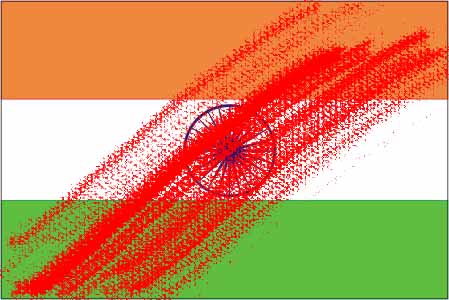
The year that was…in the subcontinent and what does it mean for Afghanistan
by Kabulpress.org’s India correspondent, Dr. Deepali Gaur Singh
Reading time: (Number of words: )
November 26, 2008 is being now commonly referred to as India’s 9/11 in the aftermath of the Mumbai terror attacks on that day. It is ironic that India should need to borrow a label from an America tragedy - which truly and quite horrifically claimed thousands of lives in a matter of hours; but India has a longer history of such attacks and today ranks amongst the highest victims when it comes to casualties of terror. And yet what really has been the true import of Mumbai 26/11?
The Mumbai strikes – irrespective of who masterminded them - were the culminating attacks of a series in the subcontinent; the Marriott hotel in Islamabad, the Indian embassy in Kabul apart from the numerous bomb blasts in India, Pakistan and Afghanistan over the last year. What this has effectively meant is a derailing of a peace process between the countries, especially India and Pakistan, which is important to most countries in South Asia and the larger Asian region, not to mention in the immediate neighbourhood of Afghanistan.
The traditional history of finger-pointing had returned with the Indian embassy attacks and the more recent arrests and counter arrests of ‘spies’ is only a reminder of the 1990s when being a member of the Indian or Pakistan consulate was not without its implications whenever relations between the two countries deteriorated. The Kargil War of 1999 barely a decade ago happened immediately after the peace process between Pakistan’s PM Nawaz Sharief and his Indian counterpart, Atal Bihari Vajpayee. It took ten years to get the process back on track.
The Indian government implicated the ISI in the Kabul embassy attacks and the banned Lashkar-e-Taiyabba in the more recent Mumbai attacks. The links between the two have long been established. LeT’s founder, Maulana Masood Azhar – one of the men freed during the Kandahar hijacking (Indian Airlines Flight 814 from Kathmandu) of December 1999 in exchange for the plane load of hostages quite suspiciously (and hardly surprisingly) disappeared from what was first reported as his house arrest in Pakistan.
And meanwhile even as the two countries started by playing down the possibility of a war the American administration jumped in by stating that they would support India’s right to defend herself. On the other side, the well wishers, this time for the Pakistani side have been the Pak Taliban who have stated that they would join Pakistan’s war effort against India, having tired of the skirmishes with the Pakistani army. More importantly, the Afghan Taliban leadership, like Mullah Omar, distanced themselves from groups like that of Baitullah Mehsud for carrying on attacks against fellow Muslims.
A war with India would help them reclaim their position amongst the Taliban brethren at a time where there are signs of many of the Afghan Taliban moving towards a more political agenda from a militarized one.
As early as 2002 the US administration had wanted India to play a more direct (military) role in Afghanistan which the Indian government very staunchly declined even going to the extent of issuing directives asking Indians to avoid contracting with private agencies operating in Afghanistan or Iraq. It is only recently with India’s humanitarian aid and the infrastructural activity in the country that Indian presence in the country has increased.
The last thing, amidst all the violence the region needs is a war between India and Pakistan. While it would help to shift the focus from the Pak-Afghan border and if the Pak Taliban do join the war against India then possibly even de-escalate the violence there given that President Karzai has constantly blamed attacks from across his eastern neighbour for the constant instability in the country. Besides, it would certainly serve the immediate interests of groups engaged there. But a war will not help to dismantle terror networks as has been the experience of the NATO in Afghanistan.
he Jammat-ud-Dawa (JuD), now a front organisation of Lashkar-e-Taiba, banned by the US several years ago is already believed to be preparing to revive under a new name in the wake of the UNSC ban on it after the Mumbai terror attacks. The presence of senior JuD cadres at a recent rally in Pakistan under the banner of Tehreek-e-Hurmat-e-Rasool points to this possible development.
The American President-elect, Barack Obama started his first visit to Afghanistan last year on the wrong foot with President Karzai when he insinuated that Afghanistan was yet to get ‘out of the bunker.’ Now, as he gets ready to take over office he has reiterated his earlier commitment of aid to Afghanistan. But the scenario in the region has become far more complicated post 26/11. India and Pakistan are engaged in a second guessing game with both looking to avoid confrontation and yet looking for adequate reasons to blame the other if such a situation does become unavoidable. India goes to the polls this year.
The Pakistani administration is fresh from polls last year and is struggling with an economy in shreds and an army that wants to remain all powerful. President Karzai too has to go back to the electorate for a mandate on his five years of presidency. The political situation in the region remains very fluid and what happens between India and Pakistan could very well shape the future for many actors in the region including Afghanistan.

Poems for the Hazara
The Anthology of 125 Internationally Recognized Poets From 68 Countries Dedicated to the Hazara
Order Now








